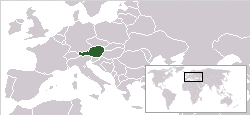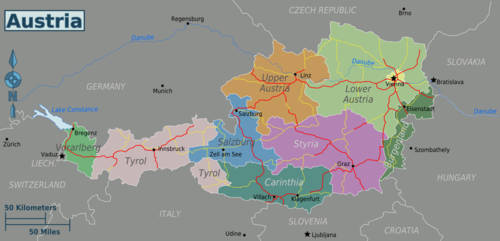The Republic of Austria(German: Republik Österreich), commonly known as Austria, is a landlocked country located in central Europe. It borders many countries, Hungary and Slovakia to the east, andItalywithSlovenia, West side isLiechtensteinwithSwitzerland, North isGermanywithCzech Republic. The capital and largest city is Vienna, whose international code is AUT. Austria was a core part of the Habsburg dynasty that ruled Central Europe for 650 years.
learn
history
The name of Austria was first seen in the records of the Roman emperor Otto III in 996, derived from the word "Ostarrichi" in Old High German. This small land surrounded by land has a profound influence on the political and military development of Europe. From the 13th century, the Habsburg dynasty began to rule Austria for 650 years, becoming one of the earliest established countries in Europe, and establishing a solid alliance and extensive trade agreements in the European continent. Austria and Hungary later combined into a powerful empire, which brought stability to the two countries. This relationship lasted until the end of the First World War, and Germany's clutches reached Austria during the Second World War. After these conflicts, Austria’s territorial boundaries have been re-defined, and the independence of the Republic of Austria has made it a democratic country that prides itself on its neutrality and stability.
geography
The population exceeds 8 million. The country covers an area of 83,855 square kilometers (32,377 square miles). At the same time, Austria has become a mountain country because of the existence of the Alps. Only 32% of the country’s land is below 500 meters (1,600 feet) above sea level. The highest point is 3,798 meters (12,461 feet). ). Austrians can enjoy the advantages that benefit from the alpine terrain, and their athletes often excel in winter sports such as alpine skiing, ski jumping and snowboarding.
politics
The President is the head of state of Austria and is elected by a referendum every six years. The president is responsible for nominating the prime minister, who is usually the leader of the largest party in the parliament. The Austrian Parliament consists of two chambers, the Bundesrat (Bundesrat) consisting of 69 state representatives and the National Rat (Nationalrat) consisting of 183 directly elected members. The National Council is responsible for enacting laws, presiding over the inauguration of the new government, and dismissing the federal government and its members through a vote of no confidence.
area
Austria is a federal republic composed of nine states (states):
city
Other destinations
arrival
aviation
Vienna International Airport is an international airport located 18 kilometers (11 miles) southeast of Austria and the capital Vienna. It is the busiest and largest airport in the country. The airport can handle wide-body aircraft such as Boeing 747 and Airbus A380. Austrian Airlines (including subordinate airlines) and Nicky both make this hub airport.
Most European airlines have direct international flights from their hub airport to Vienna. However, only Austrian Airlines operates routes to the Americas (to New York, Toronto, Washington, and Dominica), and there are no routes to Northern England and Africa (except Egypt, Libya and Tunisia), so you must transit from these places to Vienna.
railway
All railway station names in Vienna begin with the German "WIEN". This regulation has been recognized internationally and is very helpful for ticket purchases. The railway is operated by ÖBB (Austrian Federal Railways). The ticket windows at Vienna's Maidling Station and Vienna West Station will be open during train operation hours (approximately 5:00 am-11:00 pm). International trains often have trains from neighboring countries and regions. Night trains and high-speed European-City trains will depart from other central European cities. There will be high-speed ICE, Ruijie, and Pendilion trains from Munich, Budapest, Zurich, Prague and other places. Trains depart to the border regions of Czech, Slovakia, and Hungary at least every hour.
At the two main train stations in Vienna (South Station and West Station), you can buy tickets at the ticket machine, because not all ticket windows can buy tickets. At the same time, most tobacco shops ('Tabak Trafik') can also buy tickets, but not all tobacco shops sell tickets, so you can only find a tobacco shop with a blue WL logo on the door.
Private car
bus
Passenger ship
Travel around
Language
The official language of Austria is German. But unlike the High German used in Germany, it is similar to the Austrian dialect.
go sightseeing
Activity
Shopping
Overhead
Safety
Austria is one of the safest countries in the world. According to the 2006 OECD fact book, the level of robbery, assault and car crime is the lowest among developed countries. A study by Mercer listed Vienna as the sixth safest city in the world among 215 cities. Violent crimes are extremely rare and should not involve ordinary tourists. Uninhabited areas such as small towns and forests are very safe at all times of the day.
Beware of pickpockets in crowded places. Like anywhere in Europe, they are becoming more and more professional. Bicycle theft is rampant in big cities, but it is almost non-existent in small towns. Always lock your bike to a fixed object.
Racial discrimination can also be a problem, making your stay an unpleasant experience. As in other parts of Central Europe, there may be obvious hostile expressions; even unprovoked interrogations by police in large cities such as Graz or Vienna are not uncommon. However, racism almost never appears in the form of violence. In the more remote areas of Austria, non-whites are a rare sight. If you see a local old man giving you weird eyes, don't feel threatened. They may just show curiosity or distrust of foreigners, and have no intention of causing any personal injury. A brief conversation is often enough to break the deadlock. Muslim tourists should note that Buka and Niqab are illegal in Austria.
Don't walk on the bike lane (especially in Vienna), and don't cross the bike lane like any other road. Some bike lanes are difficult to identify (for example, on the "ring" in Vienna), and some cyclists drive quite fast. Not only is it considered impolite to ride a bicycle, but it can also happen that you get knocked down by a cyclist.


